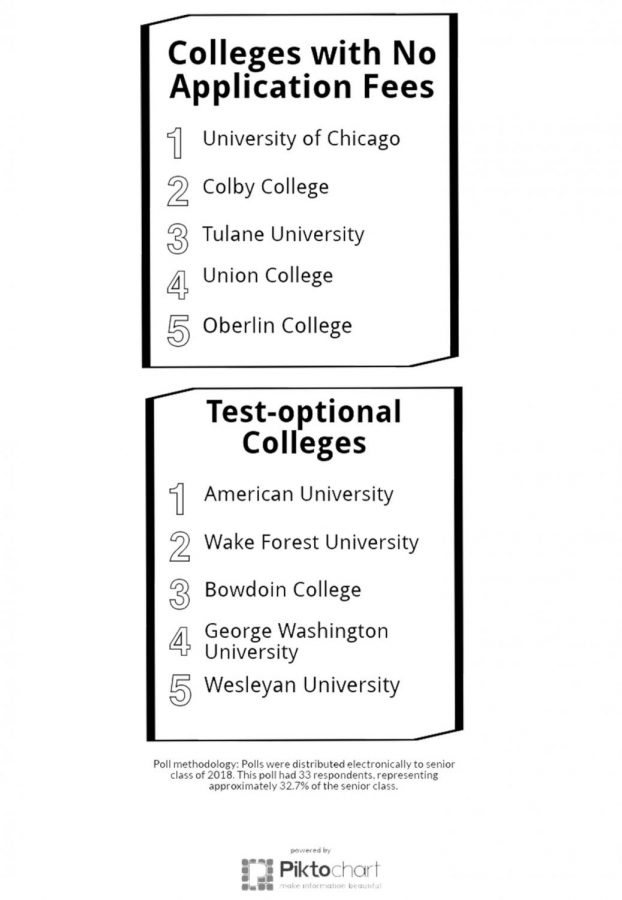The real cost of applying to college
Test prep, testing fees, college applications, and tuition prove to be a significant burden for some students.
Credit: Graphic by Lei Anne Rabeje
January 16, 2018
How much money do students spend on college? (i.e. test prep, SAT tests, SAT subject tests, ACTs, application fees, sending score reports, AP tests, test prep books)
Weekly hour-long ACT Prep classes, three-hour long SAT testing on a Saturday morning, and nights spent mulling over college applications. These are some of the burdens–or privileges– of the ever growing competition in college admissions. Right now, high school juniors and seniors are spending more and more money for a shot at the top colleges: $62.50 for the ACT test with writing, $80 on each college application, $12 to send SAT scores to each college. But this is just the beginning.
Applying to college is expensive. Between the costs of test prep, test prep books, SAT or ACT fees, and sending the scores to colleges, the fees continue to rake up. According to a Dial poll, an upper school student spends an average of $1000 to $2500 on test prep tutors and $200 on test prep books. While many begin studying for these tests in the summer between sophomore and junior year, some start earlier, causing the costs to hike up even more.
Senior Hanna Mark has been taking test prep classes since 6th grade to apply for Johns Hopkins’ Center for Talented Youth summer program. “I thought that if I could get it done early, then it would be a lot easier and I wouldn’t have to worry about in junior or senior year,” said Hanna. “It was beneficial in test-taking skills, but it did take a lot of time away from me.”
Amongst the biggest burdens of applying to college are standardized testing fees. For some, standardized testing can be a one-and-done deal, but most students take these tests at least two times in hopes of raising their superscore. With the ACT costing $42, or $62.50 with writing, and the SAT costing $46, or $60 with writing, taking the tests multiple times may cause a financial strain.
Apart from the financial costs, students also feel that standardized testing is not a proper judgement of one’s academic abilities. In a recent Dial poll, an anonymous commenter said, “Tests themselves only really gauge one’s ability to memorize an excess amount of material, and not show how much they learned.”
According to the Dial poll, the combined expense of test prep and testing fees, along with its inability to gauge a student’s full academic ability, have led 42% of the students to disagree that standardized testing is a fair system.
An anonymous student commented, “Studies have shown that standardized testing is essentially a measure of one’s socioeconomic class. If you have access to tutoring, which is crazy expensive, but also extremely advantageous, you will have a much greater chance of scoring higher. Even for those who do have access to tutoring, some students are naturally better at standardized testing than others, but I don’t think that actually correlates to intelligence.”
Senior Connor Larson disagrees. “I think that, when viewed in the context of a holistic application, standardized testing is a fair and important assessment for college admissions,” said Connor. “Standardized testing provides a critically important means to objectively and consistently compare applicants. Other measures, primarily GPA, are highly variable; the same work might earn an A- from one teacher, but only a B from another teacher. I don’t think that standardized testing is inherently more classist than the rest of the educational system.”
Hackley also works to help alleviate some financial burden of applying to college for students who receive financial aid. Through the College Counseling Office, students can apply to receive “[support] in the same proportion that a family may qualify for financial aid outside of and separate from the EC Fund.” In other words, students who receive 50% financial aid can apply to receive 50% back of the money spent.
This aid covers a wide range of costs; including, two SAT Subject Test registration fees, application fees for up to ten colleges, and CSS profiles for up to ten colleges.

